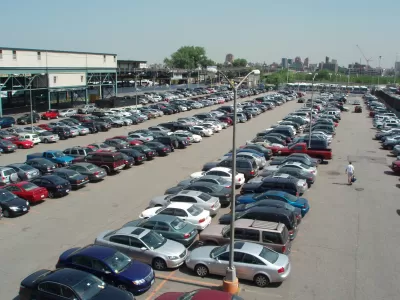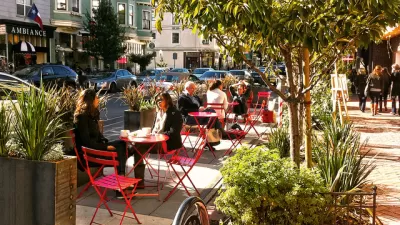Cities like Vancouver are rethinking parking minimums as they try to meet climate goals, reduce traffic, and reallocate street space to other modes.

To counter the current model of prioritizing parking with each new development, Vancouver's city council approved a motion shifting focus toward "open option parking," giving developers a choice when it comes to providing on-site parking. Acknowledging that car owners will look for on-street parking, the city is also implementing a permit parking system for resident vehicles. The goal, writes Frances Bula for the Sightline Institute, is to signal to the public that "roads are not free space or a right to free car storage," a mentality that has prevailed for decades in cities.
Like many cities, Vancouver has a parking requirement of roughly one stall for every residential unit and similar rules for different types of commercial and office space. Removing these requirements would make it the second Canadian city, and only one of a few in North America, to legalize optional on-site residential parking in the entire city.
Critics of "excessive" parking mandates argue that the regulations raise the cost of construction, reduce the space available for pedestrians, bikes, and other uses, and prioritize car owners above everyone else. As cities move to reduce greenhouse gas emissions, alleviate congestion, and provide more affordable housing, parking policies have come to signify an outdated planning tool that negatively impacts neighborhoods and the environment.
FULL STORY: The Hidden Costs of “Over-Parking” Our Cities

Planetizen Federal Action Tracker
A weekly monitor of how Trump’s orders and actions are impacting planners and planning in America.

Map: Where Senate Republicans Want to Sell Your Public Lands
For public land advocates, the Senate Republicans’ proposal to sell millions of acres of public land in the West is “the biggest fight of their careers.”

Restaurant Patios Were a Pandemic Win — Why Were They so Hard to Keep?
Social distancing requirements and changes in travel patterns prompted cities to pilot new uses for street and sidewalk space. Then it got complicated.

Albuquerque Route 66 Motels Become Affordable Housing
A $4 million city fund is incentivizing developers to breathe new life into derelict midcentury motels.

DC Area County Eliminates Bus Fares
Montgomery County joins a growing trend of making transit free.

Platform Pilsner: Vancouver Transit Agency Releases... a Beer?
TransLink will receive a portion of every sale of the four-pack.
Urban Design for Planners 1: Software Tools
This six-course series explores essential urban design concepts using open source software and equips planners with the tools they need to participate fully in the urban design process.
Planning for Universal Design
Learn the tools for implementing Universal Design in planning regulations.
Heyer Gruel & Associates PA
JM Goldson LLC
Custer County Colorado
City of Camden Redevelopment Agency
City of Astoria
Transportation Research & Education Center (TREC) at Portland State University
Camden Redevelopment Agency
City of Claremont
Municipality of Princeton (NJ)





























